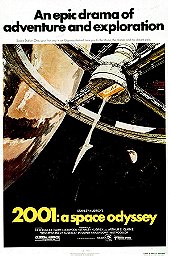Throughout the past 40 years, we have witnessed some of the most memorable science fiction films of all time by use of impressive effects and extraordinary characters within such imaginative worlds. But what became the birth of this and, therefore, became a breakthrough and opened a new generation of science fiction was Stanley Kubrick’s 2001: A Space Odyssey. At the time, there had never been anything like it before and, quite frankly, there has been nothing compared to it ever since, not even the 1984 sequel 2010: The Year We Make Contact. Nevertheless, 2001: A Space Odyssey is truly one of the most important films ever and is an eerie that embarks us into the unknown world of space but is also beautiful to watch and ultimately defined cinema as a form of art.
Originally 2001: A Space Odyssey had shockingly been met with a mixed critical reception and had not become a financial success, but it did take home one out of four Academy Awards that it was nominated for. Stanley Kubrick always gave us his vintage style of filming but with the majority of his films, especially 2001: A Space Odyssey, he wanted to illustrate new meanings for the audience. Kubrick added the essence of natural beauty on Earth and in space and attempts to not so much make the film as entertainment but to provide a thought-provoking feeling to it. It analyses from the beginning of mankind; hence the ‘Dawn Of Man’ sequence, to how we have intelligently and technologically advanced. During this process, 2001: A Space Odyssey contained certain elements about the Universe and philosophy; not only in the ‘Dawn Of Man’ sequence but in almost every act of the film.
Kubrick’s sci-fi is slow in terms of pacing. This could frustrate specific viewers and words like ‘boring’ could immediately come into play. However, due to 2001’s central theme being nature, Kubrick’s eerie and occasionally haunting portrayal of outer space, the Universe and mankind is simply for audiences to observe and reflect on for themselves. It is not to entertain an audience but it is to provide a clearer and more realistic understanding of our world and others beyond it. 2001: A Space Odyssey could have been a traditional sci-fi for its time with less advanced technological features, but it was the slow, observant tone and stunning visuals which highlighted the film as a benchmark of the genre as it bridged between classic and modern science-fiction. In fact, the visual effects as well as Kubrick’s directorial approach is arguably the greatest among any other science-fiction film today.
Films that are considered the greatest of all time usually feature notable actors among Hollywood. However, Stanley Kubrick went even more original as he cast unknown performers as 2001’s central characters. Admittedly, the characters were second-best due to the visual and natural representation of life that the film reflected on but these actors still had impressive roles. Some may argue that these characters were underused but we managed to stick along with Dave and his crew along their odyssey through space. Keir Dullea gave a solid performance as protagonist Dave as did Gary Lockwood and William Sylvester as Dave’s fellow crew members. Furthermore, although this is only a voice-acting role, the stand-out performer was Douglas Rain as HAL 9000. Rain’s calm, relaxed voice worked beautifully as HAL as it sounded exactly like a computer but his portrayal added a sense of humanity to the character, particularly in the iconic "Daisy Bell" sequence.
While 2001: A Space Odyssey does not have a specific target audience, it does require a specific audience to fully appreciate it. Its slow pacing enables viewers to understand the way of outer space and the Universe more naturally than most science-fiction films. This became highly important upon 2001’s release in 1968 and became the ‘New Hollywood’ within the science-fiction genre. Nevertheless, Kubrick’s glistening yet surreal contribution on this phenomenon became the greatest achievement of his career and deserves its place among the greatest and most important films in cinema history.
10/10
 Login
Login